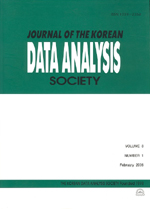입원한 허혈성 심질환자의 우울 관련 요인
Depression Related Factors of Hospitalized Patients with Ischemic Heart Disease
- 한국자료분석학회
- Journal of The Korean Data Analysis Society (JKDAS)
- Vol.12 No.2
-
2010.04811 - 823 (13 pages)
- 23

본 연구는 입원한 허혈성심질환자의 우울과 이에 영향을 미치는 관련요인에 관한 횡단적 조사연구로서, 협심증과 심근경색증으로 입원한 94명의 성인을 대상으로 구조화된 설문지로 면담을 통해 자료를 수집하였다. 대상자의 우울정도는 17.0점으로 중정도의 우울상태에 속하며, 그관련요인인 피로는 4.51(10점 만점), 불안은 2.27(4점 만점), 희망은 2.94(4점 만점)였다. 입원한 허혈성 심질환자의 우울은 피로가 심할수록, 불안이 높을수록, 희망이 낮을수록, 교육정도가 낮을수록 심하였으며, 피로(β=.455), 희망(β=-.204), 불안(β=.196), 교육정도(β=-.194)의 순으로 유의한 영향을 미치는 요인이었고, 우울을 약 62.0% 설명하는 것으로 나타났다. 허혈성심질환자의 우울을감소시키기 위해서는 우울정도를 사정하고, 피로와 불안을 감소시키고, 희망을 갖도록 하는 간호중재가 모색되어야 할 것이다.
This cross-sectional study was conducted to investigate the level of depression and the influencing factors on depression of hospitalized patients with ischemic heart disease. Data were collected from a convenient sample of 94 adult patients with the diagnosis of angina pectoris or myocardial infarction through interviews with structured questionnaires. Mean score of depression was 17.0, moderate depression, and the item mean scores of fatigue, anxiety, and depression were 4.51(/10.0), 2.27(/4.0), 2.94(/4.0), respectively. Their depression levels were significantly influenced by fatigue(β=.455), hope(β=-.204), anxiety(β=.196), educational level(β=-.194), which explained 62.0% of the variance. This findings indicate that health care providers need to assess the level of depression routinely and to develop nursing interventions for reducing fatigue and anxiety, and facilitating hope.
1. 서론
2. 연구방법
3. 연구결과
4. 논의
5. 결론
참고문헌
(0)
(0)